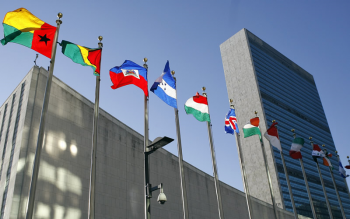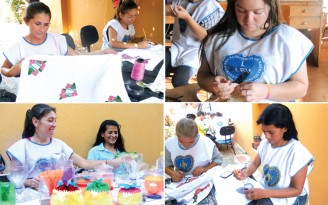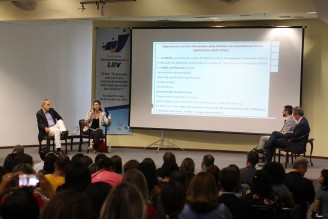
Hour of Good Will — The seed of the LBV hits the 64-year mark
By the Editorial Staff
Thursday | October 10, 2013 | 6:08 PM | Last update: September 22, 2016, 4:08 PM (Brasilia time)
On March 4, 1949, journalist, radio broadcaster and poet Alziro Zarur (1914-1979) pioneered in the medium of radio with the program Hour of Good Will. In those days, the Brazilian social activist already defended the cause of Ecumenism without frontiers and the brotherhood of men and women regardless of their beliefs, as he was the great proclaimer of Total Ecumenism in the world, a thesis he upheld from childhood when he launched his Crusade of Brotherly Religions, a forethought of inter-religious relationships.
From the microphones of Radio Globo, in Rio de Janeiro/RJ, Brazil, came messages of comfort to the sick of body and Soul carried on words of Faith, Hope and Solidarity. Created in the golden period of radio in Brazil, the Hour of Good Will program surprised the radio industry of the time and soon reached national repercussion, consolidating one of the tasks that the founder of radio in Brazil, Roquete Pinto (1884-1954), envisioned for the media: its social function.
One of the main peculiarities noticed by millions of faithful listeners of the program was the fact that Christmas carols were continuously played in the background regardless of the day of the year, having as foundation the solidary spirit of the Permanent Christmas of Jesus, for "the hunger of people is a daily occurrence”, as Zarur used to say during his broadcastings.
LBV’s first steps were at ABI
It was in the Board of Directors’ office at the Brazilian Press Association (ABI), in the months of October, November and December 1949 that journalist Alziro Zarur conducted the preparatory meetings for the future appearance of the Legion of Good Will, an Organization that soon after its foundation - on the following January 1st, on the World Day of Peace - took its first steps replete of freedom and universalism, ideals that have inspired the House of the Journalist. The first public meeting of the Legion of Good Will headed by Zarur, on January 7, 1950, took place exactly in ABI’s Council Hall and was supported by its partners, directors and the President of the House at the time, famous journalist Herbert Moses (1884-1972).
Currently, the LBV is presided by the also radio broadcaster, journalist, writer and composer José de Paiva Netto, and is considered one of the largest Third Sector organizations in the field of education and promotion of human and social issues. It has consolidated itself in Brazil and in the world as an example of serious and efficient care towards the needs of all of those who live in situations of social risk.
The early days of the LBV, by Chico Anysio

In those bygone days in 1950, the legionnaire cause was already meriting the support of personalities from different social segments such as, for instance, acclaimed comedian Chico Anysio. In an interview to the TV show Brasil Democrático, of Rede Mundial de Televisão (World Television Network), the comedian commented the following: "I am also a part of the very select group of people to whom Alziro Zarur spoke about the Legion of Good Will for the first time. At the time I was a radio-actor at Mayrink Veiga, and had already left Guanabara. Our radio-theater director was Zarur. On that day we had to rehearse the day’s chapter of the radio novel; it must have been around six thirty when he arrived, saying that he had received a divine message. He was shaking all over and was very nervous, unable to conduct the rehearsing. So, Urbano Lóis took over the task. And we all understood Zarur (...). From then on he was a transformed person. So I was the first to know this. He dropped everything. He was no longer the director of radio plays. He made a radio program called Hour of Good Will, aired at six in the evening. (...)He created the Legion of Good Will (1/1/1950). It was Zarur’s Soup, the Soup of the Poor. After that, the beggars of Rio de Janeiro were no longer hungry, because the soup he distributed satisfied the hunger of all. I know of the seriousness of this act, it was never a means to earn money, or to lead anybody on. I make donations to the LBV, I have done so repeatedly. (...)”.
On that occasion, Chico was also interviewed by the Super Good Will Radio Network and made it a point to highlight the work of the Organization’s leader: "(...) Paiva Netto is an important person because he faithfully kept to the dictates of Zarur, who was a very serious man. So is Paiva Netto, without hurting anyone, without shocking or injuring anyone. The Legion of Good Will grew amazingly with Paiva Netto, it’s unbelievable, it has spread throughout the world! He was brilliant and lent a great deal of visibility to the Organization. Their work with the elderly and with children, with everything for that matter! I support the LBV whenever I can because I think the work they do is a very important one”.
Sede della ONU (Organizzazione delle Nazioni Unite)
A work that encourages the world
The Legion of Good Will works in partnership with the diverse sectors of society (governments, socially and environmentally responsible companies, international organisms, schools, community associations and other civil society organizations), in a way that opportunities may be provided so that every citizen may collaborate towards the progress of his/her community and, consequently, of his/her nation.

One of the most important global challenges signed in 2000, during the Millennium Summit, known as the eight Millennium Development Goals (MDGs), brought together 191 member countries for the definition of a set of goals to be achieved by 2015 to improve the quality of life of Humanity and seek the sustainability of our globe. The LBV has broadly supported this worldwide campaign by means of its social and educational actions during these 60 years and by the articulation of other social actors, promoting meetings and disseminating information in dozens of cities in Brazil, Latin America and Europe.
From such activities, the Solidary Society Network was created and has contributed regionally towards greater actions for sustainable and integrated development with the multistakeholders.
In addition to the role of mobilizing civil society around the Millennium Development Goals, since 2006 the LBV serves at UN headquarters, in New York, as founder member of the NGO Committee on Spirituality, Values and Global Concerns, a committee of the Conference of NGOs in Consultative Relationship with the United Nations (CONGO). The objective is to contribute to an open and practical debate about the importance of Spirituality in global development, a cause defended by the Legion of Good Will since its origins, in the decade of 1940. Hence, several seminars and events in the UN headquarters have attracted the attention of world authorities to this matter of great value.


